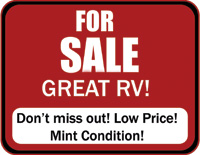 In the market to buy an RV? One of the big choices is whether to buy new or used. Buying a new RV can give you a measure of protection since your new unit will come with a warranty. Not every new RV is perfect, however, and if there are bugs to be worked out, you may spend some time going back and forth to the dealer.
In the market to buy an RV? One of the big choices is whether to buy new or used. Buying a new RV can give you a measure of protection since your new unit will come with a warranty. Not every new RV is perfect, however, and if there are bugs to be worked out, you may spend some time going back and forth to the dealer.
As with a new car, once a new RV has rolled off the dealer’s lot, an amazing thing happens: depreciation. A motorhome just a few months old with even a few miles on it is now worth less than that brand-new unit back on the lot. For a used RV buyer, that’s an advantage—the first owner paid the price of depreciation. You may be able to buy a bigger rig with more features that appeal to you for the same price you’d have paid for a new one.
Still, buying a used RV doesn’t come without its own issues. If the RV hasn’t been cared for, the buyer is the one who gets stuck fixing the problems. Buying a used rig from an RV dealer will give you protection if you buy from a dealer who will stand behind the rig. Still, when evaluating a used rig, even from a dealer, make sure everything works. This means insisting that all appliances be shown to you in running condition—the water heater, furnace, stove, microwave, air conditioner, and especially the refrigerator. Take a thermometer with you and put it inside the refrigerator—if the temperature isn’t in the 30s, there’s a problem. Do a thorough test-drive of a motorhome.
If you find anything that needs to be fixed, don’t give a deposit, don’t sign any paperwork, don’t make any commitment to purchase until the dealer has fixed the problems, and proved that the problems really have been fixed. Once you’ve given money or “signed on the dotted line,” even if a dealer has promised he’ll fix the problem, he might not. Better to hang onto your cash!
Regardless of whom you’re buying from, a dealer or a private party, make sure you really inspect the rig, top to bottom, inside and out. When you make your walk-through, open the cabinet doors, particularly the ones at ceiling height. Look inside those cabinets at the roof area. If you see any discoloration, peeling of materials, or any sign there may have been water, RUN, DON’T WALK, away from that RV. Water damage from a leak is perhaps the most dangerous damage to an RV because it can fatally damage the unit’s integrity. Don’t let anyone convince you that it’s OK, the leak was fixed. True, it may have been fixed, but hidden damage can haunt you.
Once you’ve settled on a rig that you really like and that meets your budget, have it carefully inspected. If you’re not sure of what you’re looking for, pay to have an expert look it over. This may mean taking the rig to a DIFFERENT dealership. If the dealer who is selling the rig has a fit about having a competitor do the evaluation, he might be hiding something. A private party shouldn’t have a problem with having the rig checked out, although if the rig has to be taken to a dealership, he may want to come along to make sure you’re not pulling something.
Where can you get a “good deal” on a used RV? You may find a good deal at an RV dealership, but be prepared to pay more than from a private party, though purchase from a private party might be riskier. Older folks who’ve bought an RV, lovingly cared for it, and finally had to hang up the keys are often an excellent source of good used rigs. If you hit the “Snowbird Belt” in areas of Texas, Arizona or Florida, you’ll often find rigs for sale by folks who’ve found they like living in the warmer climates so well, they’ve bought a “sticks and bricks” home there and no longer have use for the RV.
It’s not a bad idea to purchase an extended warranty on a used rig. If you buy the rig from a dealer, check his price offering on the warranty against the price you’ll be offered by an independent group.
Russ and Tiña De Maris are authors of RV Boondocking Basics—A Guide to Living Without Hookups, which covers a full range of dry camping topics. Visit icanrv.com for more information.

I think buying an RV brand new would be the right way to go because of the added protection. If you are going to put down money for a used RV, why not chip in a little bit more and get an included warranty. I grew up going to national parks with my parents in a sweet, retro RV. I am planning on getting one soon to do the same with my kids.
I agree that a big choice when buying an RV is to buy a new or used one. You also said that not every RV is perfect. I think it’s important to choose an RV that your vehicle can safely tow.